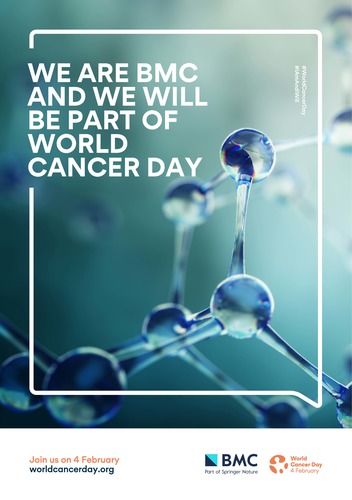
As Editors, we are committed to innovative research that positively transforms our communities. We unite with authors, editors, researchers, and readers around the world to make cancer a global health priority.
One of the ways in which we do this is by continually participating in a broader initiative, the Springer Nature Grand Challenges Portal, which bridges the gap between the research we publish and real world problems. Our most recent post to the Global Health challenge introduces research highlights in cervical cancer, and leads our readers to a quiz to test their awareness on cervical cancer.
Following the collective initiative to raise awareness about cancer, we have also curated a collection of articles within the topics of prevention, detection, and treatment. Highlights from the collection are below, and the full campaign can be found on our Oncology Open Access Research web page.
Our highlighted research about prevention includes the general epidemiology of cancer, a robust collection of epidemiology in breast cancer, and a focus on how perception affects prevention and screening programs. Case reports, such as this article about mediastinal follicular dendritic cell sarcoma, inform research about detection and diagnosis. Among other areas of research involved in detection and possible prevention are molecular biomarkers, such as EZH2 and its underlying epigenetics.
Biomarkers are also studied in the prognosis and treatment of different cancer types. CircRNAs like circHIPK3 may play a role as a prognostic biomarker in colorectal cancer, and the prevalent research of BRCA1 variants in the clinical treatment of breast cancer has led to the development of new bioinformatics tools to study these genetic variants. New computational software in cancer genomics has also made personalized treatment more feasible.
While most clinical trials concern quantitative data about treatment, patients’ perceptions collected in qualitative research also characterize meaningful treatment effect. Systematic guidelines and overviews may concern clinical applications—such as allogeneic stem cell transplantation (allo-HSCT), boron delivery agents, and neoantigen cancer vaccines (NCVs)—or a review may concern conceptual theories such as the topic of aneuploidy in cancer genetics. In all of these article highlights, we hope that the research clearly address key issues and possible solutions.
Finally, we would like to present the launch of our first Cancer Awareness Poetry Competition. Inspired by the themes of taking action and uniting communities, we invite everyone, irrespective of their occupation, to submit. How has cancer affected you? Has your experience led you to find a creative outlet as a method of support and strength?
We’ll continue to support World Cancer Day and cancer awareness. Join us by creating a custom poster, tagging #BMCraisecancerawareness in your related activity, or by following @OncoBioMed on Twitter.
Comments